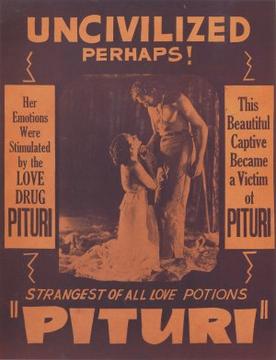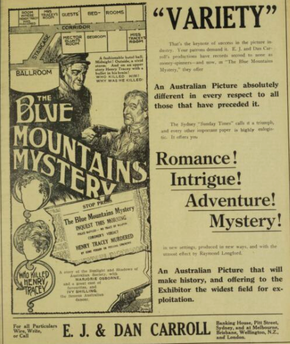Efftee Studios was an early Australian film and theatre production studio, established by F.W. Thring in 1930. It existed until Thring's death in 1935. Initially Efftee Films was based in Melbourne and used optical sound equipment imported from the US.

Uncivilised is a 1936 Australian film directed by Charles Chauvel. It was an attempt by Chauvel to make a more obviously commercial film, and was clearly influenced by Tarzan.

The Blue Mountains Mystery is a lost 1921 Australian silent film directed by Raymond Longford and co-directed by Lottie Lyell.
His Royal Highness is a 1932 Australian musical film directed by F. W. Thring, also known as His Loyal Highness, starring George Wallace in his feature film debut. It was the first Australian film musical.
Harmony Row is a 1933 Australian musical comedy directed by F. W. Thring and starring popular stage comedian George Wallace. It marked the film debut of Bill Kerr.
A Ticket in Tatts is a 1934 musical comedy film starring popular stage comedian George Wallace as an accident-prone stablehand. It was the last of three films Wallace made for F. W. Thring.

Francis William Thring III, better known as F. W. Thring, was an Australian film director, producer, and exhibitor. He has been credited with the invention of the clapperboard.
Fellers is a 1930 Australian comedy about three friends in the Australian Light Horse during the Palestine Campaign of World War I starring Arthur Tauchert, who was the lead in The Sentimental Bloke (1919). The film is mostly silent with a recorded music score as an accompaniment, but the last reel was synchronised with a few minutes of dialogue and a song.
Diggers is a 1931 Australian comedy film produced and directed by F. W. Thring starring popular stage comedian Pat Hanna. It was the first feature film from both men.
Waltzing Matilda is a 1933 Australian film directed by and starring Pat Hanna. It features Coral Browne.
Diggers in Blighty is a 1933 Australian film starring and directed by Pat Hanna. Hanna decided to direct this film himself after being unhappy with how F. W. Thring had handled Diggers (1931).
Joseph George McParlane, known as Joe Valli, was a Scottish-Australian actor who worked in vaudeville and films. He had a long-running vaudeville partnership with Pat Hanna as "Chic and Joe".
Sheepmates was a proposed Australian film from director F. W. Thring based on a 1931 novel by William Hatfield. It commenced filming in 1933 but was abandoned.

Keane of Kalgoorlie, or a Story of the Sydney Cup is a 1911 Australian silent film set in the racing and gambling circles of Sydney, based on a popular play by Edward William O'Sullivan and Arthur Wright, adapted from the novel by Wright.
The Man They Could Not Hang is a 1934 Australian film directed by Raymond Longford about the life of John Babbacombe Lee, whose story had been filmed previously in 1912 and 1921. These silent films were called "one of the greatest box-office features that ever came out of this country." The sound film was not as successful.

A Rough Passage is a 1922 Australian silent film directed by Franklyn Barrett based on the novel by Arthur Wright. It was Barrett's final feature and is considered a lost film.
John P. McLeod was an Australian writer and broadcaster. For a time he was an in-house screenwriter for F.W. Thring at Efftee Studios.
A Co-respondent's Course is a short 1931 Australian film. The screenplay was written by Montague Grover (1870–1943), an experienced journalist. The film was the first film made by Efftee Studios, a production company owned by F.W. Thring, the first Australian narrative film to be completed with an optical soundtrack and part of the first all-Australian full-length unit programme to be screened in Australia.
Riding to Win is an Australian comedy drama silent film starring Australian gangster Squizzy Taylor and his girlfriend Ida Pender. Made in 1922 it was banned by the Victorian censor but obtained release in Sydney and Brisbane under the title Bound to Win.
Oh! What a Night! is a 1932 Australian short film written by and starring George Wallace.






